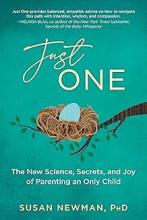Book Reviews

Just One:The New Science, Secrets, and Joy of Parenting an Only Child
Susan Newman, Ph.D.
July 15, 2025
ISBN-13: 978-1493088584
Contact: Anthony Pomes, apomes@globepequot.com
Reviewed by Edith G. Tolchin (edietolchin.com/book-reviews)
“There’s no study that shows one family size is better than another,” begins author Susan Newman, Ph.D. in her enlightening introduction. She adds, “Today, decisions about family size center around being the best parent instead of the number of children you have.”
This piece is important for those adults who straddle the fence of whether to add or not to add—or even if to procreate.
Countries throughout the world have set policies to encourage childbearing—and many policies have backfired. Pandemics, economy and climate change are robust birth control. Yet, single parenting has increased, as have older-aged pregnancies.
Dr. Newman advises readers to “Stay alert to those silent influences. . .” like friends who do not comment, which could still affect your choices. Health and age can affect fertility. She provides a lot of data with which to consider your choices. Most singletons will outgrow the sib-desire, and often a pet to care for suffices.
No worries about “only child syndrome. . .” “If you do a great job raising your kid, siblings should not matter.” Emphasizes Newman, “. . . being alone is not the equivalent of being lonely,” and she advises against packaging and marketing their “onlies” for college.
Setting boundaries, assigning chores (according to a Harvard Grant Study), and (yes!) screen time are all acceptable for only children. Also, they never need to deal with sibling rivalry. (One assumes the youngest sib is often a “problem child;” however, in the case of this reviewer—the family’s “baby,” it was the eldest sibling in a family of three children, who was a bully.)
Long gone are the days of (just one) stay-at-home parent—more often moms—a/k/a “workhorses” with several offspring. And according to Dr. Newman, having an only child, with or without shared parenthood, “has become the new normal,” and it’s just fine.
Just One is a thorough, inclusive, and supportive guide for those “on the fence” of family planning. The “Notes” section at the end substantiates, in 15 pages, the extensive research done by Dr. Newman. Bottom line: there is no right nor wrong in choosing to raise a singleton.
